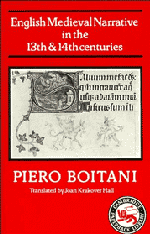6 - Chaucer
Published online by Cambridge University Press: 04 April 2011
Summary
With Chaucer English medieval narrative reaches full maturity; in Chaucer English literature finds the author who, despite all the fluctuations of critical opinion, will always be considered its ‘father’, its Homer. The cultural and poetic atmosphere of the latter half of the fourteenth century favoured the formation of a ‘classic’ paradigm, for the first time, in the English vernacular. Even apart from the blind alley represented by the Gawain-poet, we have seen this process beginning with Langland and Gower. But Chaucer, in his own lifetime (about 1340–1400) and in the generations following, acquired a special importance: a host of poets, in England and Scotland, explicitly imitated him and celebrated him as their master. Part of the reason for this success was undoubtedly the fact that Chaucer wrote in a dialect, that of London, which was about to become the national literary language: certainly his success at Court and among the gentry also worked in his favour. Of course the themes of his works had a general interest, and the elegance and refinement of his poetry evoked a ready response in society. All this, however, is not sufficient to make a classic, still less to assure that it remains one when the vernacular in which it is written becomes archaic and hard to understand, when the society that formed its audience has disappeared, when some of its themes have lost their importance and its forms have been superseded by others.
- Type
- Chapter
- Information
- Publisher: Cambridge University PressPrint publication year: 1982
- 14
- Cited by



